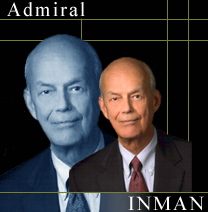

Admiral Bobby R. Inman, USN, (Ret.) was announced the ENTOVATION KEN Practitioner of the Year 2002 in West Orange, New Jersey, in a ceremony that was part of the E100 Roundtable - 'Harnessing Collaborative Advantage' attended by ENTOVATION colleagues from 17 countries.
For decades of knowledge leadership the opportunity to shape collaborative advantage.

Admiral Inman graduated from the University of Texas at Austin in 1950 with a degree in History, and from the National War College in 1972 and then served as assistant and chief aid to the to the Vice Chief of Naval Operations. He became an adjunct professor at the University of Texas at Austin in 1987. He was appointed as a tenured professor holding the Lyndon B. Johnson Centennial Chair in National Policy in August 2001.
Admiral Inman served in the U.S. Navy from November 1951 to July 1982, in a variety of administrative, operational and intelligence posts and rose through the ranks from ensign to four-star admiral – the first intelligence specialist to do so. While on active duty he served as Director of the National Security Agency and Deputy Director of Central Intelligence.
After retirement from the Navy, he was selected the first Chairman and Chief Executive Officer of the Microelectronics and Computer Technology Corporation (MCC) in Austin, Texas and served for 4 years. As its first leader, he brought several qualities: a national identity, insider know-how and know-who regarding the Washington scene and a reputation for integrity and intelligence. Inman can be credited with architecting the facility selection in Austin, the recruitment of a significant number of large-scale companies who were in many cases, arch competitors.
Motivated by President Reagan’s Innovation Task Force, lawyers were sending signals to US industry that cooperative research programs were not necessarily illegal – paving the way for the consortium’s activities in pre-competitive research. The approval of MCC activity prepared the landscape for many national R&D consortia to follow suit (e.g., SEMATECH and the National Center for Manufacturing Sciences).
MCC used a technopolis framework promoting new kinds of relationships/alliances between public and private sectors – especially government, business and academia. Technology transfer mechanisms were given a high priority to enhance the transfer of knowledge with MCC and consortium members; and the design of the research program was to promote technological commercialization and economic development.
Admiral Inman served as President and Chief Executive Officer of Westmark Systems, Inc., a privately owned electronics industry holding company for three years and as Chairman of the Federal Reserve Bank of Dallas from 1987 through 1990.
Admiral Inman's primary activity since 1990 has been investing in start-up technology companies. He is also a member of the Board of Directors of Fluor, Massy Energy Company, Science Applications International Corporation, SBC Communications and Temple Inland. He serves as the Trustee of the American Assembly , the Center for Excellence in Education and the California Institute of Technology. He is a Director of the Public Agenda Foundation and is a member of the National Academy of Public Administration.